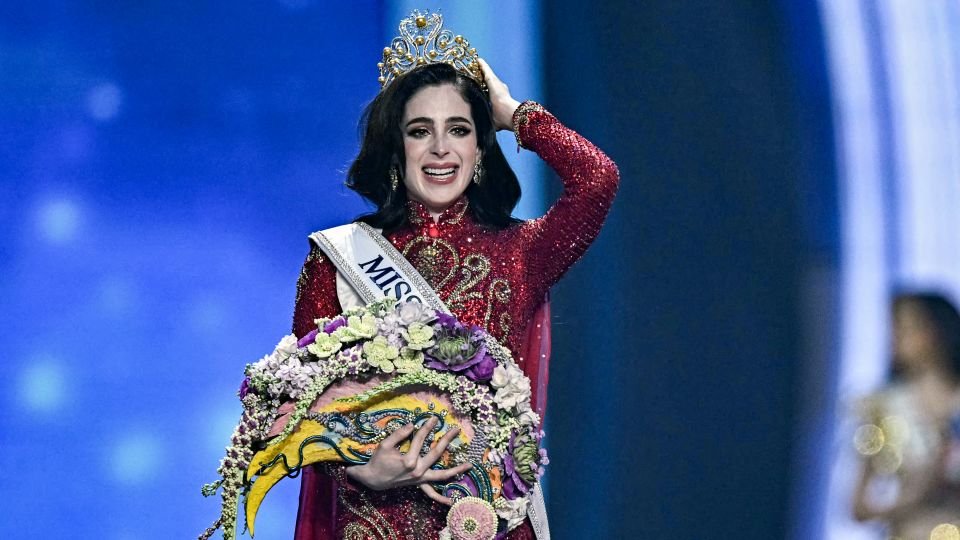The Miss Universe 2025 pageant crowned Fatima Bosch of Mexico amid a whirlwind of controversy. From walking out on organisers to allegations of rigging, this year’s pageant has highlighted deeper structural and cultural issues that raise questions about the relevance and management of one of the world’s longest-running beauty contests.
In this article, we critically examine the events surrounding Fatima Bosch’s win, the scandals backstage, organisational mismanagement, cultural tensions, and what these mean for the future of the Miss Universe brand.
Fatima Bosch Walks Out: The Start of a Scandal
Earlier in November, Fatima Bosch left a pre-pageant event after being publicly berated by a Thai official, Mr Nawat Itsaragrasil. The official scolded her for failing to post promotional content and threatened to disqualify any contestants who supported her. Bosch’s decision to walk out in protest sparked a media firestorm, with dozens of other contestants joining her in solidarity.
The Miss Universe Organization condemned the behavior as “malicious,” while Mexican President Claudia Sheinbaum praised Bosch for showing courage and standing up to gender-based aggression.
Critically, this incident reflects power imbalances in pageant culture, where contestants can be publicly shamed or coerced into compliance. Bosch’s walkout became a symbol of resistance, but it also raised questions about organisational professionalism and accountability.
Judge Resignations and Allegations of Rigging
A week later, two judges resigned, with one claiming that organisers pre-selected finalists, undermining the credibility of the competition. Lebanese-French musician Omar Harfouch accused the organisers of rigging, while former French football star Claude Makelele resigned citing personal reasons.
The Miss Universe Organization refuted the rigging claims, but the resignations cast doubt on the integrity of the pageant. Social media reactions suggest that some audiences believe Bosch’s victory was compensation for previous injustices, reflecting a perception that pageant outcomes may be influenced by controversy rather than merit.
Backstage Drama and Contestant Safety
The 2025 pageant also faced incidents affecting contestant safety. During the preliminary evening gown round, Miss Jamaica fell onstage and required hospitalisation. Though no serious injuries occurred, such accidents highlight the risks contestants face and the need for robust safety protocols during high-stakes live events.
Combined with the walkout and judge resignations, these incidents contribute to an image of a pageant struggling to maintain professionalism and fairness.
Leadership Turmoil and Organisational Complexity
The current controversies underscore structural issues in Miss Universe’s management. Thai organiser Mr Nawat Itsaragrasil oversees the pageant’s events, while Mexican businessman Raul Rocha manages the overarching organisation. This dual leadership has led to confusion over authority, weakening brand clarity.
Previously, under owners like Endeavor and Donald Trump, the leadership was centralized, offering clear accountability. Now, divergent management strategies between Bangkok and Mexico have created tension and diluted strategic cohesion, affecting both operations and public perception.
Cultural Clashes and Audience Expectations
Cultural differences play a key role in the pageant’s turmoil. Analysts suggest that Thai and Latin American cultural norms differ, influencing contestant expectations, audience reactions, and media coverage. Bosch’s win, for example, resonated strongly with Mexican audiences but stirred skepticism elsewhere.
The pageant is also navigating evolving global values, including inclusivity and empowerment. Former owner Anne Jakrajutatip allowed transgender women, married women, and women with children to compete, signaling progressive reform. However, such inclusivity clashes with traditional views in some regions, creating tension between modernisation and legacy audiences.
Social Media, Influencers, and the Decline of Traditional Broadcast
Miss Universe is increasingly adapting to digital consumption, as traditional broadcasts face declining audiences. Platforms like TikTok and Instagram allow contestants to become influencers, monetizing personal brands beyond the stage.
While social media provides opportunities for visibility and e-commerce integration, it also amplifies controversies. Bosch’s walkout, judge resignations, and backstage incidents became global news within hours, showing that digital platforms are both an asset and a liability for the pageant.
Is Miss Universe Still Relevant?
The events surrounding Miss Universe 2025 raise critical questions about the pageant’s relevance. Once a global television spectacle, it now competes with digital entertainment, influencer culture, and evolving gender expectations.
Analysts argue that for Miss Universe to remain significant, it must:
-
Emphasize empowerment over spectacle
-
Maintain transparent judging and organisational accountability
-
Adapt to cultural diversity without alienating core audiences
-
Leverage digital platforms responsibly to engage global audiences
Critically, Bosch’s crowning reflects a balancing act: the organisation attempts to reward merit and bravery while navigating controversy, highlighting the complex challenges of modernising a legacy pageant.
Empowerment and Future Prospects
Despite scandals, Miss Universe retains cultural importance in regions like Latin America and Southeast Asia, where titles offer social mobility and opportunities for young women. However, empowering contestants must remain central. As former president Paula Shugart noted, the pageant is worthless if it doesn’t support and empower the women who compete.
Future success will depend on reconciling commercial, cultural, and ethical priorities, maintaining brand credibility, and ensuring safety and fairness for participants.
Conclusion: A Pageant at a Crossroads
Miss Universe 2025, with Fatima Bosch’s victory, serves as a lens to examine leadership, fairness, and cultural complexity in global beauty competitions. While controversies grabbed headlines, the underlying issues—dual leadership, cultural clashes, declining broadcast relevance—pose long-term challenges for the brand.
The crowning of Bosch is more than a single win; it represents the intersection of tradition, empowerment, and controversy, highlighting the urgent need for clarity, inclusivity, and integrity in the evolving landscape of beauty pageants.



1 Comment
Check out gamebaivn! If you’re into games, this might be your new go-to spot. Had some fun exploring it! See for yourself: gamebaivn